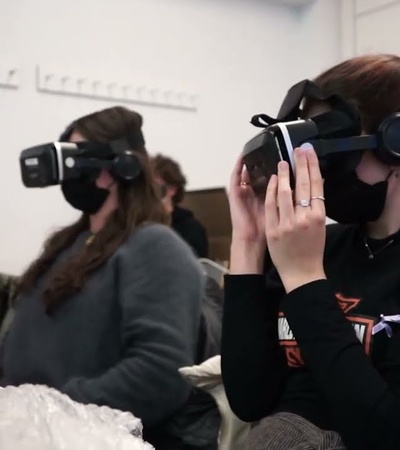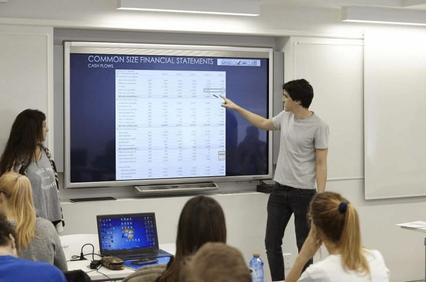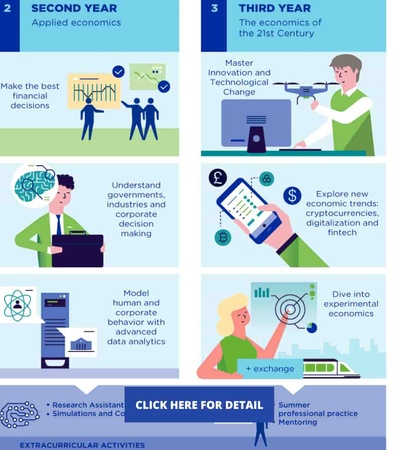Bachelor in Economics
Bachelor in Economics
Drive economic transformation in the digital era
- Home
- Studies
- Undergraduate Degrees
- Bachelor In Economics
A UNIQUE BACHELOR IN ECONOMICS
A UNIQUE BACHELOR IN ECONOMICS
The study plan for the Bachelor in Economics at IE University has been designed with the prestigious academic experience at its core, our academic faculty’s expert knowledge and research in each area, and the linkages between the University and the professional world.
The Bachelor in Economics aims to teach young ambitious individuals to build the proper skill set to become professionals capable of facing real-world challenges.
Through our hands-on teaching methodology, students from the Bachelor in Economics will find the perfect ideal balance between what is studied throughout their degree and the projects that are applied based on real-world scenarios.
This will aid them to develop profiles that are able to adapt to new trends happening now in the 21st century.

WANT TO KNOW MORE?
WANT TO KNOW MORE?
BACHELOR IN ECONOMICS STUDY PLAN
BACHELOR IN ECONOMICS STUDY PLAN
LEARN MORE ABOUT OUR BACHELOR IN ECONOMICS
LEARN MORE ABOUT OUR BACHELOR IN ECONOMICS
FIRST YEAR
Preparing for the future of economics requires professionals that understand the very basics of the field and have the skills that adapt to the rapidly changing world we live in. Throughout your first year, you will set the foundations for the rest of your four years by mixing basic economics skills with a modern twist of new challenges. Focusing on the fundamentals of economics while touching on modern programming and writing skills that will prepare you to take on deeper and more complex challenges that are to come. You will touch on theories and begin research to understand how to solve new problems that the world is currently facing.
SECOND YEAR
Understanding how the economy is shaped and governed in different societies around the world is fundamental for a successful future in this field. During your second year, you will begin refining your mathematics, decision-making and strategy skills, entering the study of human behavior and the new economy. Analyzing and interpreting information to understand how it affects the economy. Learning new tools and exploring different situations in order to propose new solutions.
THIRD YEAR
Innovation, technology and GovTech are disrupting this field to the next level. In your third year, you will dive deeper in the technology that is forcing rapid changes to the field. Learn firsthand and keep up to date with the latest strategies that will give you the ability to make the right decisions. Hone your critical thinking skills to prepare you for a future that is becoming more digital than ever. The economist that know how to analyze with different platforms and make decisions based on data are the ones that will make an impact.
FOURTH YEAR
Adapt your last year to your interests and focus. By choosing the track in Economic and Financial Analysis for Business, you will do research and focus more on the digital direction that the economy is turning to while applying it to business. In the track on Country, Sector and Policy Analysis you will concentrate on the political science spectrum, on policies, and how cities and environments are shaping the path of the economy.
THE Bachelor in Economics LEARNING JOURNEY
THE Bachelor in Economics LEARNING JOURNEY
Your path to career success unveiled through our engaging infographic: Explore it to discover more about the program structure!
BACHELOR IN ECONOMICS Tracks
BACHELOR IN ECONOMICS Tracks
COUNTRY, SECTOR & POLICY ANALYSIS
Studying economics allows you to specialize in the intersection of the private and public sectors. The Country, Sector & Policy Analysis track gives you a deep dive into topics such as economic policy, country risk analysis, strategic sectors and international consulting. You’ll build the knowledge and skills that will prepare you to lead and succeed in different fields.
IS FOR STUDENTS WHO ARE…
interested in understanding how regions, societies and economies face a constantly evolving array of new technologies, ideas, and problems and how this change is playing out in key strategic sectors, from consulting or research to sustainability, energy, labor markets or global governance.
LOOKING FOR…
the knowledge and tools to research and deeply understand the internal and external dynamics that drive industries, regions and countries, and to design effective organizational and country strategies for growth, sustainability and impact.
TO BECOME…
- an international consultant
- an economic researcher in a private company
- an economics or policy analyst in a multilateral organization, impact investment company or think tank
- a business-development or data analyst in international development
ECONOMIC AND FINANCIAL ANALYSIS FOR BUSINESS
Studying economics allows you to specialize in the intersection of the private and public sectors. The Economic and Financial Analysis track gives you in-depth insights into topics such as digital banking, blockchain and cryptocurrencies. You’ll build the knowledge and skills that will prepare you to analyze technological impacts in the financial and economic sectors.
IS FOR STUDENTS WHO ARE…
interested in gaining a comprehensive and analytical understanding of finance and risk in the financial and economic sectors, including the concepts of risk analysis, decision-making, economic analysis and real-world finance cases, in industries ranging from fintech and digital banking to asset and portfolio management. It’s especially suitable for those who are eager to succeed in the global finance sector.
LOOKING FOR…
an understanding of economic systems through analytical lenses, such as econometrics, risk management, and finance, as well as firsthand insight into how financial analysis is applied to the valuation of companies, how to manage the assets of your business based on investment objectives, and how to gain a competitive edge in trading.
TO BECOME…
- a financial analyst in a bank
- a trader or trading analyst
- a fintech consultant or analyst
- a financial research analyst
- a quantitative research analyst

INNOVATIVE PEDAGOGY
INNOVATIVE PEDAGOGY
At IE University, we offer a fully immersive learning experience, incorporating the latest technology to stimulate creativity and innovation. Find out more here about how we’re reshaping education with the use of virtual reality (VR) in the classroom.
Partnerships
Partnerships
Learning a new language can open up a world of new opportunities
Learning a new language can open up a world of new opportunities
IE University considers multiple language acquisition to be a key element of its educational model, leading to success in both work and study.
The Language Center at IEU is proud to offer students the possibility to study a wide range of languages, including French, German, Portuguese, Chinese, Arabic, Spanish, and English. With such a large variety of options, our students are able to personalize their academic path to meet their future career plans and objectives.

The Language Center at IEU
The Language Center at IEU
The Language Center helps students develop their multilingual communicative skills to help them flourish in the international labor market.
THE DUAL DEGREES OF IE UNIVERSITY
THE DUAL DEGREES OF IE UNIVERSITY
Develop a multidisciplinary profile and specialize in two distinct, yet connected fields, by combining another bachelor degree with your studies in Economics.
DUAL DEGREE IN ECONOMICS + INTERNATIONAL RELATIONS
The Dual Degree in Economics and International Relations is a rigorous and challenging program where students obtain solid economic foundations combined with global geopolitics, powered by advanced analytical technologies and tools.
Undergraduate Degrees | English | Five yearsDUAL DEGREE IN ECONOMICS + APPLIED MATHEMTICS
The Dual Degree in Economics & Applied Mathematics combines a comprehensive understanding of economics with the robust nature of applied mathematics. Pursuing this dual degree program will provide you with a unique skill set that is increasingly sought after across a wide variety of career paths.
Undergraduate Degrees | English | Five years
COMPETENCES
COMPETENCES
Basic competences
GENERAL COMPETENCES
- Participate in public and expert debates on the economy and politics at the national and international level.
- Apply abstract reasoning and critical thinking to understand economic, political and social processes and propose solutions to complex problems in multidisciplinary environments.
- Conduct model-based socioeconomic analyses to identify dynamics and key factors affecting changes or stability over time.
- Convert large volumes of data into usable information and develop solutions that are relevant for a given context from the socioeconomic and business management standpoints.
- Write convincing written texts applicable to a variety of academic and professional contexts.
PROGRAM-SPECIFIC COMPETENCES
- Identify and design effective economic policies as a function of the national context.
- Predict trends and their macroeconomic outcomes for countries and regions.
- Simplify complex economic ideas by using practical language, figures and graphs in order to convey it in both public and professional forums.
- Derive solutions from mathematical models of behavior and economic processes and numerically calibrate these models.
- Explain consumer and company behavior in different market contexts.
- Apply strategic reasoning in academic studies and professional situations.
- Apply experiences from the history of economics to contemporary economic issues and challenges.
- Conduct quantitative analysis of economic data using statistics software such as Stata, R and Python.
- Use visualization tools to explore data, reveal patterns and communicate results in order to facilitate economic decision-making.
- Understand the limits and advantages of traditional economic models and indicators and know how to identify and effectively use the new options that have been recently developed.
- Design, perform and evaluate experiments and other types of data-based applied analysis in order to test ideas and hypotheses and draw conclusions.
- Generate strategic business plans and project management frameworks to facilitate organizations’ adaptation to rapid technological change.
- Work effectively with data within organizations’ technological ecosystems.
- Understand and apply programmatic and algorithmic thinking to perform the different stages of business analytics, including knowledge of the main business analytics tools in use.
- Apply a variety of relevant techniques, including data mining, algorithm-based machine learning, predictive models and the classification and segmentation of data from different sources and in different formats, applied to the field of economics.
- Understand how institutions, governance mechanisms and contracts work in order to maximize economic efficiency and social equity.
- Provide consultation and advising services to companies looking to maximize their impact, market shares and turnover on specific economic markets.
- Design basic investment operations, both from the point of view of financing as well as the return on investment strategy.
- Write well-structured economic reports that include clear and transparent questions, methodologies and results.
- Understand and be capable of explaining the relationship between psychology, economics and economic decision-making.
TRANSVERSAL COMPETENCES
- Communicate effectively in public, business and academic settings.
- Behave professionally in accordance with the core principles and ethics of the profession.
- Manage unforeseen situations by being able to adapt to organizational changes.
- Use knowledge of the discipline to analyze and evaluate current situations.
- Form a part of interdisciplinary and multicultural teams to achieve shared goals in a diverse environment.
- Work actively in an international context.
DEGREE INFORMATION AND INTERNAL QUALITY ASSURANCE SYSTEM
DEGREE INFORMATION AND INTERNAL QUALITY ASSURANCE SYSTEM
APPLICABLE REGULATIONS OF THE PROGRAM
APPLICABLE REGULATIONS OF THE PROGRAM
Frequently Asked Questions
Frequently Asked Questions
How hard is a bachelor of economics?
The difficulty of a Bachelor of Economics degree can vary depending on a variety of factors, including the individual's prior knowledge and background, the specific program and university, and the individual's study habits and work ethic. In general, an economics degree can be challenging due to the rigorous quantitative and analytical coursework, as well as the need to develop strong critical thinking and problem-solving skills. However, with dedication, hard work, and a willingness to learn, a Bachelor of Economics degree is achievable for many students. It is important to note that seeking help and support from professors, tutors, and classmates can also make the degree program more manageable and rewarding.
What subjects are in an economics degree?
The study plan for the Bachelor in Economics at IE University has been designed with the prestigious academic experience at its core, our academic faculty’s expert knowledge and research in each area, and the linkages between the University and the professional world.
Is economics major a lot of math?
Yes, economics major typically involves a significant amount of math, especially in the form of statistical and quantitative analysis. Additionally, economics majors may be required to take courses in statistics, econometrics, and other quantitative methods that involve complex mathematical concepts.
What are the elements/levels of bachelor in economics?
With the Bachelor in Economics at IE University through a hands-on teaching methodology, students will find the perfect ideal balance between what is studied throughout their degree and the projects that are applied based on real-world scenarios. This study plan includes basic courses, core courses, elective courses and a final project.










